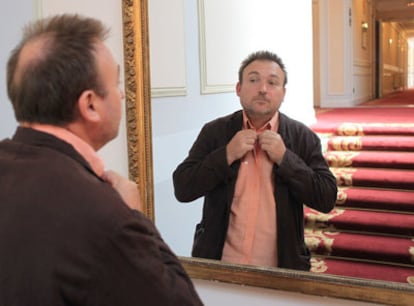"Ideas don't generate paintings"
Spain's highest-paid living artist, Miquel Barceló, presents a documentary about his work at the San Sebastián Film Festival
In front of a lion's cave in the Sangha region of Mali, and with the African sun in the distance, Miquel Barceló has said goodbye to his Paso Doble show, which he performs live with the dancer and choreographer Josef Nadj and a huge block of molding clay. He did so in front of the camera of Isaki Lacuesta in the documentary El cuaderno de barro (The clay notebook), which was presented in the Zabaltegi section of the San Sebastián Film Festival this week, and, together with the film Los pasos dobles, comprises the artist's most significant contribution to the world of cinema.
This is not the first time he has let cameras in on his creative process - he did so while he was working on great works such as the Palma cathedral or the ceiling of the UN building in Geneva. But this time he allowed them in on one of his solo works.
"I always work alone, without cameras and with no one there," explains the painter, who was born in Mallorca in 1957. "I'm not a cinema actor. By its very nature a documentary put together by a filmmaker makes those who are in it act, but I avoided that. That was the condition I gave Isaki: that I was going to do exactly the same as I would do if he wasn't there with me. And that's how it was. It wasn't easy, because I had to concentrate really hard not to become distracted, and even more so with that huge camera that Isaki was using - it was like some kind of high-tech weapon."
The origin of Paso Doble is in Mali, the country in which Barceló has lived for long periods over the last 20 years, and this return was designed to be a way to take the performance back to its roots.
The recording took place at dusk, using the sun as a marker for the live performance - when it hit the branch of the tree it was time to finish. "It was really beautiful, with the last hours of the sun. It's a village that has never seen a television - I calculate that 98 percent of the people there have never seen TV, nor any kind of moving images. They will have seen some photographs but not much else. This is not urban Africa; this is deepest Africa, where everything is still done orally and every single one of them can work with clay. They use clay like we use lime in the Mediterranean. They put layers of clay on their houses to protect them from falling down during the rainy season. And it's all done by hand. All of the gestures I use in Paso Doble I learnt there. They know how to bring their fists down on the clay."
Barceló has found something vital in Mali, in spite of the dust, the mosquitoes, the termites and occasionally the snakes and scorpions. And the diarrhea and cholera. At one point he felt that he would never go back. "My life there begins from zero - it's a clean sheet every time I go. I thought that I was not going to need to return, but time passes and I have to. There is something there that serves my life and my work." A work focused on his hands and not on his head. "I have always said that paintings generate ideas and not that ideas generate paintings - i.e., I try to ensure that the works generate thought. It's like when someone makes love in a movie, and someone smokes before and after but never during. It's the same in painting and art. You have to think before and after, but never during the moment of creation, because sometimes thinking creates paralysis."
There is only one thing for which the highest-valued living Spanish artist does not want to have an answer for, and that's precisely the influence that this has on his work. "None, none, none..." he says as he takes the elevator down to his movie premiere.

Tu suscripción se está usando en otro dispositivo
¿Quieres añadir otro usuario a tu suscripción?
Si continúas leyendo en este dispositivo, no se podrá leer en el otro.
FlechaTu suscripción se está usando en otro dispositivo y solo puedes acceder a EL PAÍS desde un dispositivo a la vez.
Si quieres compartir tu cuenta, cambia tu suscripción a la modalidad Premium, así podrás añadir otro usuario. Cada uno accederá con su propia cuenta de email, lo que os permitirá personalizar vuestra experiencia en EL PAÍS.
¿Tienes una suscripción de empresa? Accede aquí para contratar más cuentas.
En el caso de no saber quién está usando tu cuenta, te recomendamos cambiar tu contraseña aquí.
Si decides continuar compartiendo tu cuenta, este mensaje se mostrará en tu dispositivo y en el de la otra persona que está usando tu cuenta de forma indefinida, afectando a tu experiencia de lectura. Puedes consultar aquí los términos y condiciones de la suscripción digital.








































